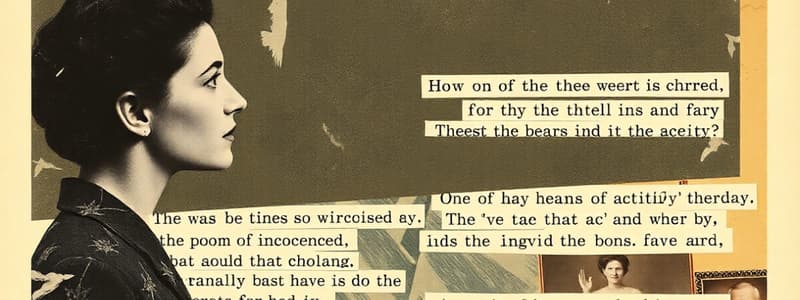Podcast
Questions and Answers
Which of the following is NOT a shared theme between "The Age of Innocence" and "The Great Gatsby"?
Which of the following is NOT a shared theme between "The Age of Innocence" and "The Great Gatsby"?
- The Role of Technology in Society (correct)
- Love and Relationships
- Social Commentary
- Themes of Time and Memory
Both "The Age of Innocence" and "The Great Gatsby" depict characters who are primarily driven by a desire for wealth and social advancement.
Both "The Age of Innocence" and "The Great Gatsby" depict characters who are primarily driven by a desire for wealth and social advancement.
False (B)
What is a key difference in the ways that the past impacts the characters' present lives in "The Great Gatsby" and "The Age of Innocence"?
What is a key difference in the ways that the past impacts the characters' present lives in "The Great Gatsby" and "The Age of Innocence"?
In "The Great Gatsby", the characters' past significantly influences their present, while in "The Age of Innocence", the characters often feel entangled and restricted by societal norms rooted in the past.
The novel "The Great Gatsby" portrays the _______ associated with the pursuit of wealth, while "The Age of Innocence" criticizes the ______ effects of rigid social norms.
The novel "The Great Gatsby" portrays the _______ associated with the pursuit of wealth, while "The Age of Innocence" criticizes the ______ effects of rigid social norms.
Match the following quotes with the characters they are associated with in "The Age of Innocence":
Match the following quotes with the characters they are associated with in "The Age of Innocence":
How does the pursuit of love differ in "The Age of Innocence" and "The Great Gatsby"?
How does the pursuit of love differ in "The Age of Innocence" and "The Great Gatsby"?
What do the contrasting portrayals of love in "The Age of Innocence" and "The Great Gatsby" reveal about the societal norms of the time?
What do the contrasting portrayals of love in "The Age of Innocence" and "The Great Gatsby" reveal about the societal norms of the time?
The novels offer similar critiques of the inability of love to truly flourish in the face of social constraints.
The novels offer similar critiques of the inability of love to truly flourish in the face of social constraints.
Which character's quote reveals a desire to conform to societal expectations?
Which character's quote reveals a desire to conform to societal expectations?
May Welland's quote, "The most admirable thing about her was her indifference," suggests she was a strong and independent character.
May Welland's quote, "The most admirable thing about her was her indifference," suggests she was a strong and independent character.
What does Ellen Olenska's quote about love reveal about her character compared to the societal values of the time?
What does Ellen Olenska's quote about love reveal about her character compared to the societal values of the time?
The quote, "The most admirable thing about her was her ______" describes May Welland's character, highlighting the superficial nature of social graces in the novel's context.
The quote, "The most admirable thing about her was her ______" describes May Welland's character, highlighting the superficial nature of social graces in the novel's context.
Match each quote with the theme it represents:
Match each quote with the theme it represents:
How does the societal context of "The Age of Innocence" compare to that of "The Great Gatsby" in terms of social mobility and class?
How does the societal context of "The Age of Innocence" compare to that of "The Great Gatsby" in terms of social mobility and class?
The quote, "Love was not a right, it was not a duty, it was simply one of the many things that one did in doing one's proper duty," suggests that romantic love was considered a secondary priority compared to societal obligations in "The Age of Innocence."
The quote, "Love was not a right, it was not a duty, it was simply one of the many things that one did in doing one's proper duty," suggests that romantic love was considered a secondary priority compared to societal obligations in "The Age of Innocence."
How does the quote, "She never was very fond of Newland Archer, however. She thought him a rather shallow man," reveal the social dynamics in the novel's context?
How does the quote, "She never was very fond of Newland Archer, however. She thought him a rather shallow man," reveal the social dynamics in the novel's context?
Flashcards
Newland Archer's Indecisiveness
Newland Archer's Indecisiveness
Archer avoids strong actions, aiming to conform to societal standards, revealing his inner conflict.
May Welland's Indifference
May Welland's Indifference
May's charm lies in her calm demeanor, exposing the superficiality of social customs.
Ellen Olenska's Views on Love
Ellen Olenska's Views on Love
Ellen passionately challenges societal norms surrounding love, showcasing her strength.
Josephine and the Countess's Opinion of Archer
Josephine and the Countess's Opinion of Archer
Signup and view all the flashcards
Social Norms and Conformity
Social Norms and Conformity
Signup and view all the flashcards
Love and Marriage's Duties
Love and Marriage's Duties
Signup and view all the flashcards
Influence of Past on Present
Influence of Past on Present
Signup and view all the flashcards
Social Mobility and Class Restrictions
Social Mobility and Class Restrictions
Signup and view all the flashcards
Setting and Atmosphere
Setting and Atmosphere
Signup and view all the flashcards
Characters' Desires
Characters' Desires
Signup and view all the flashcards
Social Commentary
Social Commentary
Signup and view all the flashcards
Love and Relationships
Love and Relationships
Signup and view all the flashcards
Themes of Time
Themes of Time
Signup and view all the flashcards
Contrasting Social Structures
Contrasting Social Structures
Signup and view all the flashcards
Superficial Class Divisions
Superficial Class Divisions
Signup and view all the flashcards
Gatsby's Pursuit of Wealth
Gatsby's Pursuit of Wealth
Signup and view all the flashcards
Study Notes
Key Quotes for Characters
- Newland Archer's hesitancy and desire for societal approval are highlighted by his quote: "He had always been rather averse to taking any strong step, and he felt that the proper course for him, which would be approved by his friends, was to be calm and unhurried." This reveals his indecisiveness and the pressure of social conformity.
- May Welland's reserved strength and the superficiality of social graces are embodied in the quote: "The most admirable thing about her was her indifference."
- Ellen Olenska's passionate nature and defiance of social expectations are evident in her words: "Love had always been a matter of passionate feelings, a tempest of sudden emotions and violent joys and sorrows."
- Josephine and the Countess's judgment of Newland is revealed in the quote: "She never was very fond of Newland Archer, however. She thought him a rather shallow man." This reveals social dynamics and scrutiny within the closed society.
Key Quotes for Themes
- The importance of social decorum and expectations in the Age of Innocence is emphasized in the quote: "The social graces were in full flower." This also illustrates the stifling nature of these standards.
- The quote, "Love was not a right, it was not a duty, it was simply one of the many things that one did in doing one's proper duty," demonstrates that love is secondary to societal expectations and duties in the novel.
- The theme of the past influencing the present is encapsulated by the quote: "He had to face the past." This showcases Archer's struggle with past decisions and inability to fully embrace the present.
- The limitations of social mobility and the rigid class structure are further demonstrated by the quote: "He felt that the proper course for him, which would be approved by his friends, was to be calm and unhurried."
Comparisons to The Great Gatsby
- Both novels are set in the early 20th century, depicting societal and economic changes. "The Age of Innocence" portrays a rigid conformist society, while "The Great Gatsby" contrasts with a more fragmented one.
- Similar to Gatsby's pursuit of the unattainable, Newland Archer struggles with social constraints and desires for personal advancement. However, Gatsby prioritizes material wealth and status, while Archer's conflict centers on societal expectations and personal desires.
- Both novels criticize social structures and the superficiality of class divisions. "The Great Gatsby" criticizes the corruption of wealth accumulation, while "The Age of Innocence" critiques the stifling effects of rigid social norms.
- Both explore complex relationships impacted by societal constraints. Ellen Olenska's struggle for independence, akin to forbidden love seen in "The Great Gatsby," is one example. However, differences exist in their motivations for love.
- Both novels explore the past's influence on the present. Archer is firmly entrenched in the past, while Gatsby's past is greatly involved in his present actions. The past's effect is deeply explored in both stories from divergent perspectives.
Studying That Suits You
Use AI to generate personalized quizzes and flashcards to suit your learning preferences.




